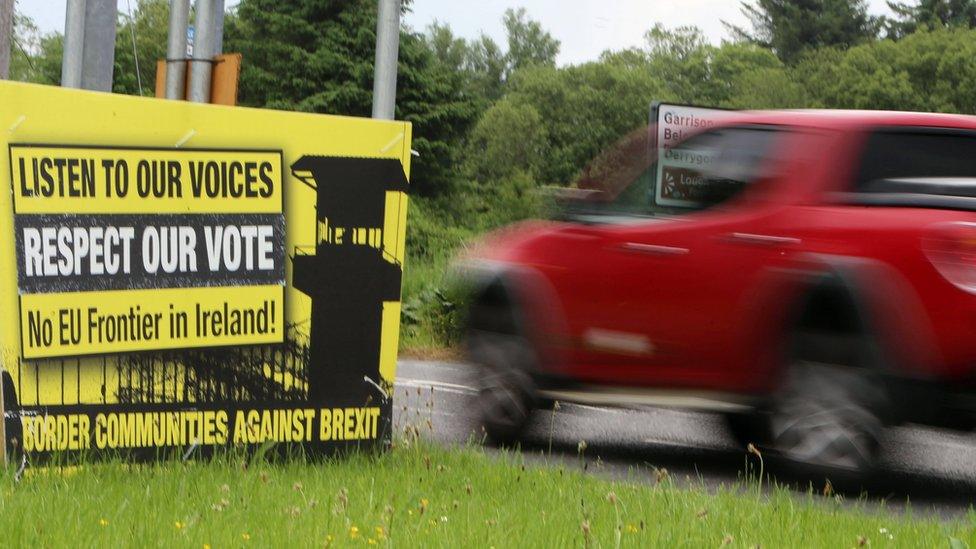When is a plan not a plan?
- Published

The government needs a customs solution that avoids a hard border in Northern Ireland
If you read this blog every now and then you'll know that there has, for many, many, many months, been a row inside the Tory party over what to do about customs after we leave the EU.
It's hugely problematic, not just because this bit of Brexit policy might have a huge impact on jobs and trade after we leave, and is likely already having an impact on businesses making decisions.
But also because it directly affects the Irish border which everyone says can't return in a hard form, but no one seems to have a robust way of preventing.
News then that there is a "new plan", in the run-up to the prime minister's big day at Chequers, was intriguing. No 10 suggested that one of the two cabinet working groups have indeed come up with revised proposals that square the seemingly impossible triangle that Theresa May has always said she wants to keep - no hard border, smooth trade, and a British independent trade policy.
Sources suggested it is different to the two proposals put forward so far, described variously as "unicorns", or "dead" - otherwise known as the customs partnership, or maximum facilitation.
No more detail of the plan was to emerge however until nearer the cabinet's meeting on Friday when the Brexit blueprint is meant to be agreed before appearing formally in a White Paper next week, as it just so happens on the same day that President Trump is due to arrive (no news that day then).
All that Number 10 would suggest tonight is that "at Chequers the cabinet will be asked to consider a proposal for future customs arrangements" that will be a "significant step forward" from the existing two models that will "give us the best of both worlds".
Swiss option?
Another Whitehall source suggested that indeed there is a new plan, even if they sounded slightly less convinced than Number 10. But it is clear that near the heart of the Number 10 Brexit process, there is a move towards, as speculation has suggested, something that looks a bit less like the buccaneering Brexit of the Eurosceptics, and rather more like the softer end of fudge - with what has been described as including the single market for goods - although importantly never confirmed by government.
And the chances of the words "single" and "market" being anywhere near Theresa May's plan are as high as Boris Johnson going on a jolly holiday with Jean-Claude Juncker. It was suggested that the closest comparison to the new overall Brexit plan is a deal something like the ones that the EU has with Switzerland.
Switzerland is not in the EU, or the EEA, but EFTA, the free trade association, and has a complicated set of individual deals with the EU.
That's one of the reasons why Brussels hates it as a model. There have been, wait for it, 25 years of negotiation. And it would provide a headache here on immigration, given that Switzerland has for years been in a fight with the EU over whether it can restrict freedom of movement or not.
Many Conservatives might be extremely relieved that finally the prime minister is moving to that kind of position. Business sources say they have been reassured it's that kind of close relationship that's on the way.
But frankly, other parts of the Tory party would go bananas. And whatever the arithmetic inside the Tory party itself, where there is a majority for something at the soft end of things, there are enough Eurosceptics who could make life impossible if they really want to. If it's a Swiss style compromise that emerges there could be big trouble.
That however is for another day when the proposals actually emerge. The immediate problem with the "new plan", is whether or not it really exists.
Does the plan exist?
Because while Number 10 says it does, ask other people in government and they are not quite so sure. Ministers who you might have thought would be aware of the detail like - oh, you might imagine - the Brexit secretary had not agreed the lines, before Number 10 made their intervention.
And it's said tonight that the reason he has not been involved in agreeing the "new plan" is because it does not actually exist yet. The customs decision expected in some parts of government therefore is what has been anticipated for some time as "max fac plus" - a souped up version of the proposal that originally won the day in the Brexit subcommittee what feels like a lifetime ago - with, you assume, a long lead-in time while the technology is made to work.
Baffled? Quite possibly so. But it's perhaps only safe to say that four days before ministers are expected to actually make some final decisions, all is not precisely as you might have expected. Number 10 says "we are working with ministers to finalise a third way".
There feels still like quite some way to go.